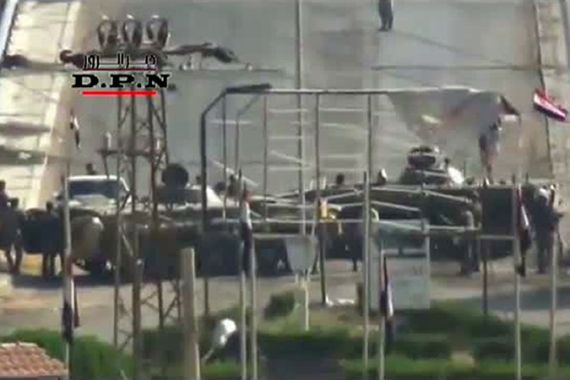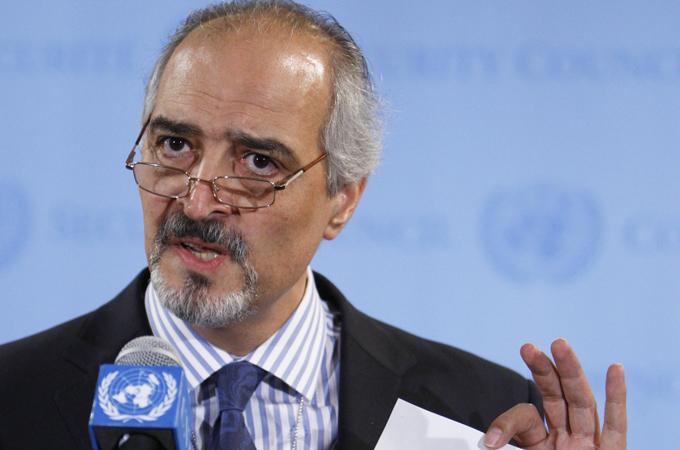Syrian forces storm two western towns
Activists say troops entered Saraqeb and that five people were killed in Qusayr, as government rejects global criticism.

 |
| Bashar Jaafari, Syria’s ambassador to the UN, says the international community should stay out of its affairs |
The Syrian army has stormed the northwestern town of Saraqeb, near Turkey’s border, and the town of Qusayr, in central Homs, activists and local residents said.
 |
Five people were reportedly killed soon after tanks entered the town of Qusayr on Thursday.
Earlier, the London-based Syrian Observatory for Human Rights said that troops stormed Saraqeb in northwestern Idlib province, detaining at least 100 people.
“Around 14 tanks and armoured vehicles entered Saraqeb this morning, accompanied by 50 buses, pick-ups and security cars,” a resident who fled Saraqeb, 50km southeast of Turkey’s Iskenderun province, said.
“They started firing randomly and storming houses.”
The Local Co-ordination Committees, an organisation that organisea and documenta the protests in the country, also said explosions and gunfire were heard after the army stormed the area.
Idlib province has witnessed intense protests against President Bashar al-Assad’s regime.
On Wednesday, an AFP journalist saw dozens of soldiers stream out of Ariha in the south of Idlib province.
A Syrian military source said the troops were pulling out of Ariha after succeeding in their mission “to hunt down saboteurs and armed groups at the request of Idlib’s residents”.
Damascus blames “armed terrorist groups” for fomenting a popular uprising in Syria that has been ruthlessly suppressed by the security forces.
Diplomatic pressure
The international community has ratcheted up pressure on Syria, with the UN Security Council threatening Damascus with stronger action if it does not stop its crackdown on protesters.
On Wednesday, Oscar Fernandez-Taranco, the UN assistant secretary-general, briefed the 15-member Security Council behind closed doors about events in Syria in the week since the council called for an “immediate” halt to the violence.
Taranco was quoted as saying there had been no letup in the deaths of protesters while UN officials had met Syrian diplomats to try to get accurate information.
Taranco’s briefing had been “depressing and chilling,” Philip Parham, Britain’s deputy UN ambassador, later told reporters.
Bashar Jaafari, Syria’s ambassador to the United Nations, said the international community should stay out of Syria’s affairs.
Jaafar said the country’s sovereignty was “a red line that must not be crossed”.
“We know our commitments, our obligations but at the same time we know what are our rights. And our rights do not stem from any political pressure. They stem from our own political will,” he said.
Barack Obama, the US president, spoke to Recapp Tayyip Erdogan, the Turkish prime minister, on Thursday about the situation in Syria.
“The two leaders underscored the urgency of the situation”, and “their belief that the Syrian people’s legitimate demands for a transition to democracy should be met”, a White House press statement reported.
The US, which has called for the Security Council to take a tougher stance, imposed sanctions on Wednesday on the commercial bank of Syria, and its Lebanon-based subsidiary, as well as Syriatel, the largest mobile phone operator.
“The regime in public will appear to be defiant, but in private the regime will be very worried that sanctions will dry up its coffers,” Malik al Abdeh, a Syrian journalist and member of the opposition movement for justice and development, said.
Since the uprising that began in mid-March the government crackdown has claimed up to 2,000 according to rights groups.